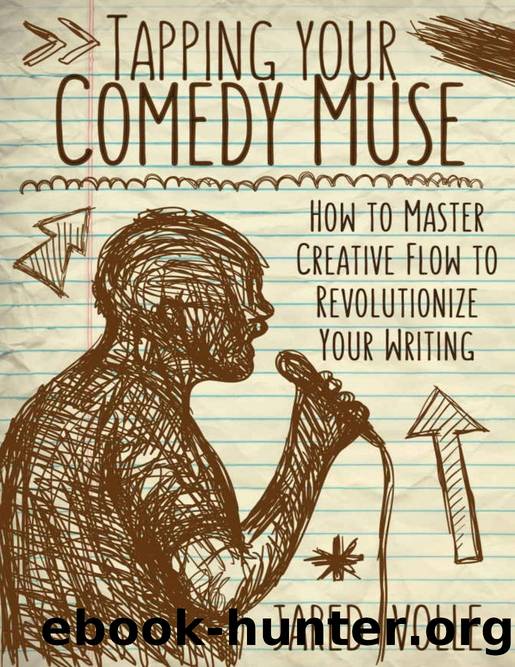Tapping Your Comedy Muse by Jared Volle

Author:Jared Volle [Volle, Jared]
Language: eng
Format: epub
Published: 0101-01-01T00:00:00+00:00
Using Feedback to Fuel Creative Flow The second aspect of flow is the ability to get immediate feedback on the evolving work. For short-term goals to be effective, you must be able to determine whether you are getting closer or further away from your desired outcome.
One of the most rewarding aspects of being a comedian is the ability to know exactly how well you are doing while performing on stage. The audience is either laughing or they arenât. This feedback provides clear goals of what to do the next time youâre working on material. Thus, each time you perform, you enhance your ability to get into flow the next time you write.
However, there is a major problem that comedians face regarding getting feedback. For feedback to help a comedian achieve flow, the feedback MUST be immediate. Usually, a comedian spends a significant amount of time writing and rewriting their material before the material ever gets on stage. Sometimes the time between writing and performing is only an hour or so, but often it can be several days⦠or even a few weeks! Flow cannot exist for long when feedback is a future activity, even if that future is only hours away. To produce flow, feedback must take place at the same time you are developing your material.
When thereâs no immediate feedback, itâs very difficult to be motivated to do anything. How inspired could a comedian be to write material if he had no idea whether he was writing quality jokes or not? Heâd write a joke, look back at it to see if itâs funny and think âI dunno.â Itâs easy to see how this would drain any inspiration to write another joke.
So how do you get immediate feedback when youâre at home writing on your computer? All great creators do it the same way, they give feedback to themselves. The only way a comedian can give himself feedback is by understanding what leads to great material or a great performance. The comedian that is able to stay in a creative flow is the one that knows how funny each punchline is.
Heâs motivated to keep writing because he can see that something special is developing in his material. He knows enough about the industry and the audience to make a reasonably accurate guess at how the audience will react.
This doesnât mean heâs correct every time. In fact, whether or not the audience laughs is a moot point in the long-run. Whatâs important is the motivation he feels to continue writing because of the feedback heâs giving himself. If heâs wrong, and the audience doesnât go along with his new material, he simply learns from the experience. He makes a few changes to his beliefs about what leads to success in comedy and then uses the new, more accurate belief to provide feedback to himself the next time heâs writing. Either way, he wins.
All else being equal, veteran comedians have an advantage over new comedians simply because theyâve been around the industry long enough to learn what works and what doesnât.
Download
This site does not store any files on its server. We only index and link to content provided by other sites. Please contact the content providers to delete copyright contents if any and email us, we'll remove relevant links or contents immediately.
Still Foolin’ ’Em by Billy Crystal(36352)
Spell It Out by David Crystal(36113)
The Great Music City by Andrea Baker(31919)
Professional Troublemaker by Luvvie Ajayi Jones(29651)
Trainspotting by Irvine Welsh(21645)
Call Me by Your Name by André Aciman(20502)
The Secret History by Donna Tartt(19061)
We're Going to Need More Wine by Gabrielle Union(19038)
Cat's cradle by Kurt Vonnegut(15340)
Ready Player One by Cline Ernest(14651)
Molly's Game by Molly Bloom(14137)
Bombshells: Glamour Girls of a Lifetime by Sullivan Steve(14062)
The Goal (Off-Campus #4) by Elle Kennedy(13658)
Leonardo da Vinci by Walter Isaacson(13321)
4 3 2 1: A Novel by Paul Auster(12378)
The Social Justice Warrior Handbook by Lisa De Pasquale(12188)
The Break by Marian Keyes(9359)
Crazy Rich Asians by Kevin Kwan(9281)
The remains of the day by Kazuo Ishiguro(8982)
